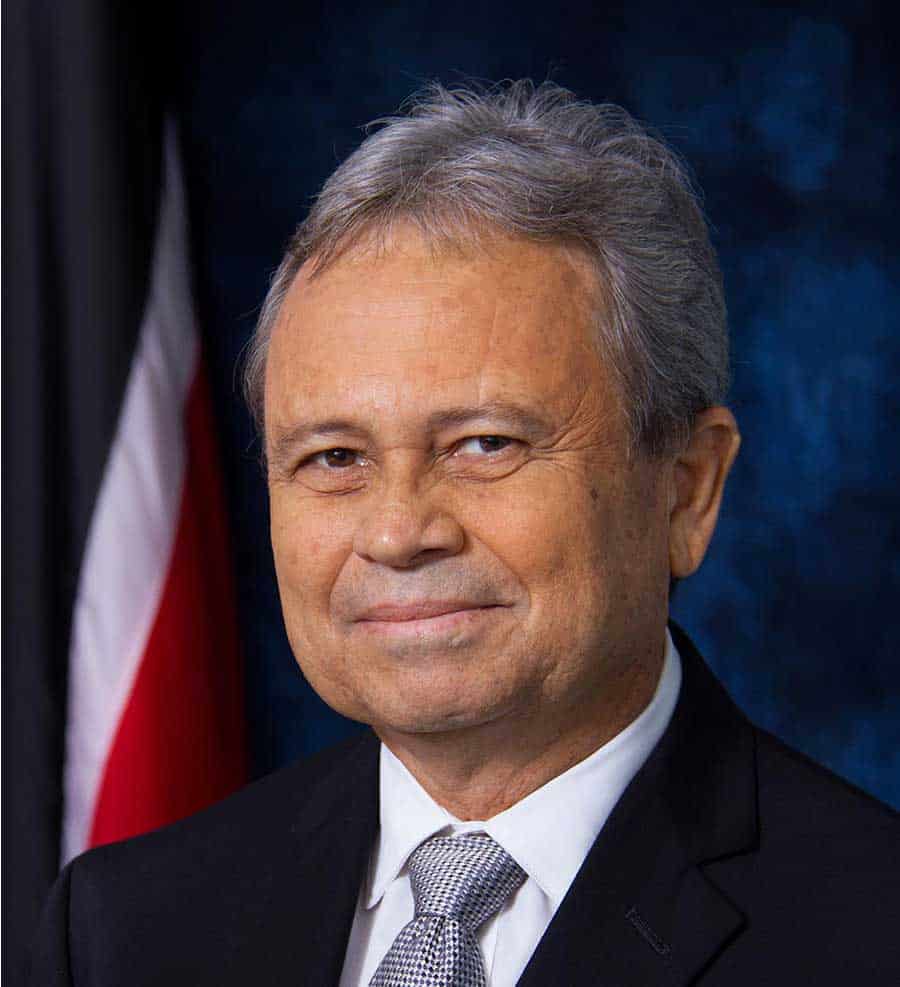
Above: Minister of Finance Colm Imbert is responsible for the allocations in the 2018 budget. Photo courtesy the Ministry of Finance.
BitDepth#1116 for October 24, 2017
There has been some mild muttering about the absence of any major ICT development or projects in the 2018 budget.
The acronym doesn’t appear at all in the formal budget statement for 2018 and the only mention of technology appears in a paragraph promising greater efforts in the area of Business Process Outsourcing (BPO).
That might seem odd, given the oft-stated importance of technology to the diversification agenda, and the government’s responsibility for institutional development.
But that’s only true if you persist in trying to understand the Government as a managerial institution, which it nominally is, rather than a living collective, an organism composed of both unitary and complementary interests.
It’s been 12 years since I had that inadvertently explained to me over lunch in a business meeting in my the last corporate office I worked in.
A very tiny number of folks already know that I served a two-year contract as a communications professional at a state agency in the local energy sector.
I was still in my first year of blissful naiveté, waxing poetic about a computer-based touchscreen installation that would dynamically tell the company’s history when a normally silent member of the exploratory committee cleared his throat.
“Ahmmm…” he said, “I not seeing how this going to get us votes.”
There have only been a few times in my life when I haven’t had a sharp or at least witty rejoinder for an interruption. This time I just watched my conceptual wicket fall, the bails and stumps of thought tumbling away in slow motion.
It was then I came to understand, with a clarity that history, economics and civics had denied me, the cohesiveness of the political animal.
Like any savvy beast, its first need is survival and politicians eat, drink and breathe votes.
That’s why TTConnect, a web-based governance delivery system on which, I am advised, some $600 million was spent, became the most expensive download site in Internet history.
If it had achieved its goal of automating routine government services, it would have cut deeply into public sector employment, thereby reducing salary based payoffs for…votes.
To get an instruction in how this works, observe the process for paying a traffic ticket. There are three people involved in taking your money, one to write a document to process your payment and one to check it before passing it to cashier.
This is a government service that could be implemented online with little effort and probably prompter compliance, but it would reduce the constitutency.
From the government’s perspective it is already busy on the ICT front with the Global Services Programme, which it has assisted the IADB in implementing.
Every other major project it might consider implementing has no clear value proposition before another election is due.
The simple truth is that successive governments have chosen to expand their recipient constituencies in the public service and through government work contracts.
When the Finance Minister complains that the private sector is indolent and uncreative, he is chastising a child grown to adulthood in the care of himself and his peers who has come to expect cookies to be readily available in the jar.
Projects designed to create significant diversification of the economy, it is becoming increasingly clear, will demand that politicians separate the vote repayment process from the necessary development of hundreds of nimble, globally focused business efforts that emerge from the ground up.
A 2016 advisory paper on BPO projects in T&T cites successful projects initiated by Direc One and iQor (call centre, customer support), Scotiabank and RBC (backoffice services).
According to the report, these services have added 2,200 jobs to the employment mix.
Despite the T&T advantage of generally solid writing skills and a command of English, the report does not point out that all of the areas in which the country has had success are being aggressively targeted by artificial intelligence driven software development.
The IADB’s Global Services Programme proceeds with a greater awareness of this looming challenge, providing an environment in which skills upgrading can be cost effectively pursued by businesses with significant ICT components.
Technology, in the Government’s collective mind, is summarised by the Public Sector Investment Programme document, which explains in greater detail the implementation of the provisions of the 2018 budget.
According to that document, “The use of Information and Communication Technology (ICT) is viewed by Government as one of the major ways to improve the efficiency, productivity and capability of its services and operations.” “In so doing, the sector plays a critical role in facilitating investment and the ease of doing business.”
In support of those goals, $63.3 million is earmarked for spending under the Public Sector Reform Computerisation Programme, which details spending on hardware and software, but makes no mention of systems design for purpose or any measurable plan to measure the impact of this spending on the customers meant to be served by these initiatives, the public of T&T.
Instead, there is a proliferation of buzzwords, “networking,” “computerisation” and the always reassuring “surveillance,” with no indication of how they will improve lives of the citizens who finance them.


I heard something similar at points in my career – and it’s just, as it was explained to me, “the way it works.”
The trouble is that it doesn’t work, and nobody really cares that it doesn’t except an apparent few who cannot change it directly.